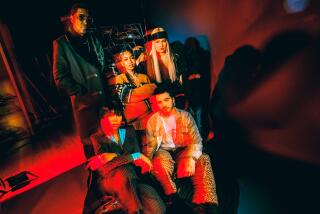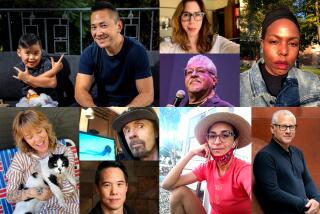The rise of quarantine pop: How two charming breakup songs became unintentional coronavirus anthems
Pop singer Benee wasn’t thinking about the emotional costs of social distancing when she came up with her viral hit “Supalonely.” Conceived last year during a songwriting trip to Los Angeles, this lightly comic expression of self-pity — in which the 20-year-old from New Zealand describes herself as “a lonely bitch” crying in the bathtub — captures the aftermath of Benee’s having split from her boyfriend just before she left home.
“The breakup was a good idea, because it was a bad relationship,” she said the other day over the phone from Auckland. “But obviously I was still sad about it. If I’d been here, I’d have had my mum and my friends around to support me. But I didn’t really know anyone in L.A., so I was feeling very alone.”
Bill Withers, who died this past week, and John Prine, now hospitalized with COVID-19, rose from working-class roots to become touchstone singer-songwriters.
Ah yes, the alienating effects of global travel. (Remember travel?) Months after Benee wrote it, with much of humanity sheltering in place amid the COVID-19 pandemic, the deeply infectious “Supalonely” has morphed into a kind of quarantine anthem — less a song about longing for the comforts of home than one about counting the days till you can get the hell out.
And it’s clearly resonating with listeners: On Spotify and YouTube, “Supalonely” has racked up more than 100 million streams, a healthy percentage of which have no doubt come from people on lockdown over the past few weeks.

Streaming charts are full right now of songs directly inspired by the international health crisis that’s changing the world in unprecedented ways. “Coronavirus,” a high-energy hip-hop track built around an exclamation by Cardi B — “Coronavirus! S— is real!” she bellows in a bit of sound harvested from an Instagram video — sits at No. 1 on Spotify’s Global Viral 50 chart, trailed not far behind by Lil Nix’s “Corona Virus,” which sets somebody’s dry cough to a booming rap beat.
Glenn McDonald, Spotify’s “data alchemist,” is regularly updating a playlist on the platform called “The Sound of the Virus”; it currently tallies 1,545 selections, among them “Spreadin’ (Coronavirus)” by the young British rapper Psychs and More Fatter’s Beatlesque “I Don’t Want to Wash My Hands (But I Guess I Will Because of Coronavirus).”
Yet the charts also reflect the surging popularity of non-virus-based songs, like “Supalonely,” that nonetheless seem to catch something of the mood of the day — the worry and anxiety and fear of mortality humming like background noise as we all go about our newly housebound routines.
Take “Death Bed (Coffee for Your Head),” a shuffling folk-rap tune with more than 150 million Spotify streams in which the Canadian artist Powfu, who’s all of 21, confesses to a lover that he’s already anticipating his final departure: “I don’t wanna fall asleep / I don’t wanna pass away,” he mumbles over forlorn acoustic-guitar strums, “I been thinking of our future ’cause I’ll never see those days.”

In a video for the website Genius, Powfu explains that “Death Bed” grew out of his love of “cringe-y” romantic melodramas by writers such as Nicholas Sparks. (Some of the rapper’s other tunes include “Running Through the Rain” and “Laying on My Porch While We Watch the World End.”) Suddenly, though, the song seems dialed into a harsher reality — one reason it just leaped 16 spots to No. 43 on Billboard’s Hot 100, where “Death Bed” ranks ahead of recent singles by Taylor Swift and Justin Bieber.
The same goes for JP Saxe and Julia Michaels’ piano-ballad duet “If the World Was Ending,” which felt pretty mawkish when it came out in October yet now fits comfortably — well, uncomfortably — among other fast-moving streaming titles like Joseph Black’s mournful “Miss Me” and “PTSD” by the emo-rap bad-dream team of G Herbo, Chance the Rapper, Lil Uzi Vert and the late Juice WRLD.
You can even detect a trace of quarantine fever in Dua Lipa’s smash disco jam “Don’t Start Now,” in which her advice to an ex has taken on a kind of public-safety vibe: “Don’t show up / Don’t come out,” she sings, as though encouraging folks to stay at home.

This flexibility of meaning, of course, is one of pop music’s core strengths; it’s what allows listeners to find room for themselves in songs written by artists from entirely different places or eras or walks of life. And it’s always been that way, as Emily Gale, who teaches pop history at Ireland’s University College Cork, points out.
Often that recontexualizing process has been driven by creators, Gale said, as in the case of the Hutchinson Family Singers, who in the mid-1800s remade a well-known minstrel song as — get this — a tune in support of abolition. More recently, you can think of Elton John tweaking his “Candle in the Wind” so that an ode to Marilyn Monroe became an ode to Princess Diana.
Yet the real-time reactivity of digital streaming — especially at a moment when traditional record-industry promotion is running at a lower level than usual — puts much of the power back in the hands of listeners, who can decide what a song is about and then push that song to ever-higher visibility through their clicks.

Sometimes the ideas can pile up, as when Joe Diffie’s song “Prop Me Up Beside the Jukebox (If I Die)” landed on Spotify’s viral chart in the days following his death last week. Sure, fans were commemorating the late country star, who died from complications of COVID-19, by spinning his early-’90s honky-tonk classic. But “Prop Me Up” was hardly Diffie’s biggest hit; this one was clearly saying something else that people wanted to hear.
Depending on how long the pandemic lasts, we’re likely to see pop stars writing explicitly about its psychological effects. Indeed, Charli XCX announced Monday that she plans to write and record a new album in self-isolation and release it next month.
Until then, though, we’ll continue to take comfort where we can find it. Asked what it’s been like to see people connect to “Supalonely” for reasons she never saw coming, Benee said she was just happy to help.
“I wrote it about my breakup, but now everyone’s relating it to being isolated and not being able to see their friends,” she said. “I guess we’re all lonely bitches now.”
More to Read
The biggest entertainment stories
Get our big stories about Hollywood, film, television, music, arts, culture and more right in your inbox as soon as they publish.
You may occasionally receive promotional content from the Los Angeles Times.











